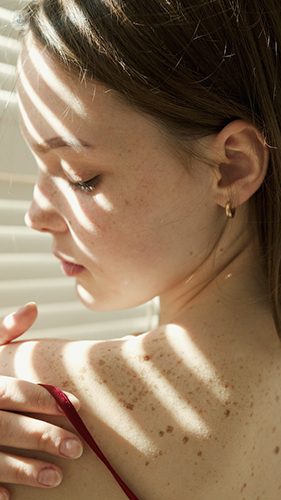Checking for early signs of skin cancer
Written in association with:Although all people have spots on their skin from the normal process of ageing, some skin lesions may be a sign of skin cancer. Dermatologists recommend checking your skin for suspicious marks at least once a month so that you are aware of any changes and can seek medical advice if needed. In this informative article, highly respected consultant clinical oncologist Dr Craig Knighton shares his expert insight on the warning signs to be aware of and the best ways to help prevent skin cancer.

What are the warning signs of skin cancer?
Skin cancer can present in various ways. When checking your skin for changes, you should look out for marks or lesions which:
- have changed in size, colour or shape
- are different from the rest
- are asymmetrical
- are rough to the touch
- show several colours
- are larger than 6mm
- sting or bleed
- have a shiny surface
- look like a wound which does not heal
Any change in size, shape, colour, surface or other feature of the spots may indicate a suspicious lesion which should be investigated by a specialist. In addition, new signs of bleeding, scabbing or itching can also indicate skin cancer. It's important to consult a doctor if you notice any of these symptoms.
Who is most at risk of developing skin cancer?
Skin cancer is more common in people over the age of fifty or in people who have been exposed to the sun in a prolonged or intense way. However, melanoma can also affect young adults. The following characteristics can increase a person's risk of developing skin cancer:
- fair skin
- burning easily in the sun
- experiencing sunburn during childhood
- spending many hours in the sun, at leisure or while working
- intense sun exposure for short periods of time, such as while on holiday
- using sunbeds
- having more than fifty moles
- having a family history of skin cancer
- having undergone an organ transplant
How can skin cancer be prevented?
Although ninety per cent of skin cancers have an excellent prognosis, an early diagnosis is important. You should go to the dermatologist as soon as you detect any changes to moles or lesions on your skin. The following steps can help to prevent skin cancer:
- intensive sun protection measures for children, including using sunscreen with factor 30+ and wearing a t-shirt and cap
- avoiding sun exposure in the peak hours of the day between 12:00 and 16:00
- protecting the skin and eyes with a cap, t-shirt and sunglasses to help avoid sunburn
- regular application of sunscreen
- avoiding sunbeds
If you are concerned about skin cancer and wish to schedule a consultation with Dr Knighton, you can do so by visiting his Top Doctors profile.


